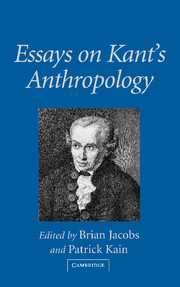Book contents
- Frontmatter
- Contents
- Contributors
- Essays on Kant's Anthropology
- 1 Introduction
- 2 Historical Notes and Interpretive Questions about Kant's Lectures on Anthropology
- 3 Kant and the Problem of Human Nature
- 4 The Second Part of Morals
- 5 The Guiding Idea of Kant's Anthropology and the Vocation of the Human Being
- 6 Kantian Character and the Problem of a Science of Humanity
- 7 Beauty, Freedom, and Morality: Kant's Lectures on Anthropology and the Development of His Aesthetic Theory
- 8 Kant's Apology for Sensibility
- 9 Kant's “True Economy of Human Nature”: Rousseau, Count Verri, and the Problem of Happiness
- 10 Prudential Reason in Kant's Anthropology
5 - The Guiding Idea of Kant's Anthropology and the Vocation of the Human Being
Published online by Cambridge University Press: 19 July 2009
- Frontmatter
- Contents
- Contributors
- Essays on Kant's Anthropology
- 1 Introduction
- 2 Historical Notes and Interpretive Questions about Kant's Lectures on Anthropology
- 3 Kant and the Problem of Human Nature
- 4 The Second Part of Morals
- 5 The Guiding Idea of Kant's Anthropology and the Vocation of the Human Being
- 6 Kantian Character and the Problem of a Science of Humanity
- 7 Beauty, Freedom, and Morality: Kant's Lectures on Anthropology and the Development of His Aesthetic Theory
- 8 Kant's Apology for Sensibility
- 9 Kant's “True Economy of Human Nature”: Rousseau, Count Verri, and the Problem of Happiness
- 10 Prudential Reason in Kant's Anthropology
Summary
The Guiding Idea of Kant's “Anthropology from a Pragmatic Point of View”
“Anthropology from a Pragmatic Point of View” – what is the unifying theme or guiding idea of this discipline, which Kant hoped to make into a field of study at the university? In the Critique of Pure Reason, Kant mentions an “idea of the whole” (B xliv), and in the Prolegomena he attributes a “soul of the system” to transcendental philosophy (IV: 374). Pragmatic anthropology, however, although it is conceived systematically and as a science (Wissenschaft), is not a philosophical system – it neither belongs to philosophy in a strict sense, nor is it articulated as a system based upon an idea of reason. It is an empirical discipline like physical geography, the science ordered next to it both systematically and pedagogically. Nevertheless the unity and a central idea must be found in order to identify the perspective that explains which material is included and excluded from it.
If we turn to the published Anthropology of 1798, then we find the somewhat enigmatic three-part definition: the pragmatic anthropology concerns what a human being as a freely acting being “makes, can, or ought to make out of himself” (VII: 119). The title “Anthropology from a Pragmatic Point of View” obviously does not do justice to the last component, the “ought,” and therefore does not take up the whole thematic.
- Type
- Chapter
- Information
- Essays on Kant's Anthropology , pp. 85 - 104Publisher: Cambridge University PressPrint publication year: 2003
- 40
- Cited by

